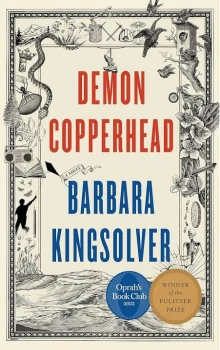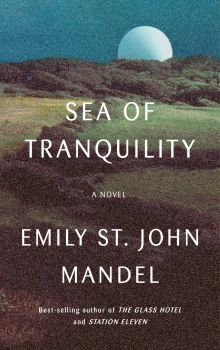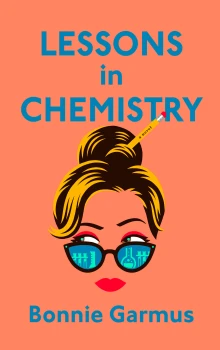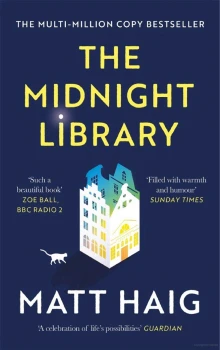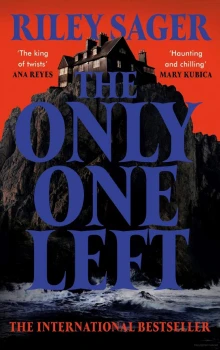The next day after school he goes back to the library, the public one, the librarian’s words drifting back to him as he nears the entrance: If there’s anything I can help with. He’s not sure if she can, but if there’s one thing he remembers from stories, it’s that people who offer help along your way—whether directing you to treasure or warning you of danger—should not be ignored.
Today, to Bird’s consternation, the library is not quite deserted. There’s another visitor: an older Black man in the how-to section, not far from the front desk. Tall and trim, a gray beard, long gray locs neatly tied back at the nape of his neck. Bird dawdles by the cookbooks, out of sight, watching the man flip books open and shut them again, replacing them with no apparent interest in what’s inside. He’ll simply wait for the man to go away, he decides, and then he can speak to the librarian without being overheard.
But after nearly ten minutes of idle browsing, the man is still loitering there. What was taking him so long? Sometimes people came in off the street, Bird knows, just looking for a place to get warm. It’s October; each day the weather gets colder, and a full decade after the Crisis there are still plenty of people living rough—lingering on street corners, hunched on park benches, dodging police and the neighborhood-watch groups. But this man doesn’t look like he lives on the street. He wears dark jeans and a tailored tan blazer, shoes of polished leather; there’s an ease to his bearing, a comfort in this place—despite his apparent aimlessness—that Bird himself doesn’t share. Yet there’s a tension, too: as if he’s readying himself for a difficult task.
Then the man pulls a small slip of paper from his blazer pocket, inserts it carefully between the pages of a washing machine repair manual, and shuts it again. A bookmark, Bird thinks. Still, something about it catches his attention: the slightly furtive glance the man casts over his shoulder, the way he nudges the neighboring books back into place, lining the spines up so precisely you can’t tell that one has disappeared. Suddenly Bird remembers the librarian searching the books at her desk last time, the note she’d retrieved. On his side of the shelf, the man straightens, as if he’s made a decision, tucks the book under his arm, and heads for the circulation desk with a new air of purpose.
Excuse me, he says to the librarian. I found this book lying around. I’m not sure but I think—I think it might have been taken out of its place.
Bird can see him more clearly now. The black-brown of his eyes, the clean white collar of his shirt. The precisely trimmed edges of his beard.
The librarian looks up, and when she speaks there’s a tightly tethered eagerness in her voice. Thank you, she says. I’ll take a look.
The man sets the book on the counter. I’m not sure, you understand, he says. But I think someone might be looking for it.
He slides the book toward her, but his hand is still pressed to the cover. As if he can’t bear to let it go.
They’re probably very, very worried, he says. The words come out thick and sticky, as if he’s trying not to cry.
I’ll do my best to find out where it belongs, the librarian says.
Bird, peering out from behind the shelf of cookbooks, understands that something is being said that he can’t hear. He senses it more than registers it: a faint thrumming felt deep in the bone. No one would cry over a misplaced book.
I won’t speak of this to anyone, the librarian is saying. Her voice is so low that Bird has to strain to make out the words. Thank you. For bringing this in.
She smiles at the man then, sets her hand on the cover beside his, not prying the book away, just holding it, waiting for the man to be ready, and at last the man lets it go.
I couldn’t live with myself if I didn’t, he says quietly. My brother and I grew up in foster care, years ago. They said our parents couldn’t provide—I was almost grown up by the time they got us back.
And then he is gone.
The librarian has just pulled out the slip of paper when she spots Bird and swiftly shuts the book again. This time Bird catches a glimpse before she slips it into her sweater pocket: jotted-down notes, what might have been an address, a name. The excitement on her face cools into wariness as she recognizes him.
Well, hello again, she says. You’re back. Did you need something else?
You said you could help me, Bird says. Last time I was here. You said—if there’s anything you could help with, to come back.
The librarian doesn’t say yes and she doesn’t say no. With the book still clutched in her hands, she studies him.
I can try, she says. What do you need?
Bird clears his throat.
I need to get to New York, he says. New York City. There’s somebody I have to see.
The librarian laughs. That’s out of my area of expertise, she says. I meant with another book. Or finding information.
This is finding information, he says. There’s someone there I need to talk to.
All last night he’d thought about it. His mother has left him this address for a reason, he is sure of it. No one else would have known about the cubby, let alone left something inside. Her letter, the story, this note: it is too much to be a coincidence. To Bird it has the certainty of a prophecy, or a quest; he feels it with the arrogant confidence only a child can have. This Duchess, whoever she is, will have something to tell him about his mother, and therefore his next step must be to go and hear it.
The librarian rubs a knuckle to her temple. I’m sorry, she says. I can’t really help with that.
Please, he says. It’s for a good reason. I promise.
But still she shakes her head.
I’m not a travel agent. And even if I were, I can’t help a kid run away.
I’m not running away, Bird begins, but she’s not listening anymore.
I’m sorry, she says again, and starts to turn away, and he decides to bluff.
I know about what you’re doing, he says, though of course he does not quite yet; he knows only that it is something illicit, something shameful or perhaps even illegal, and therefore it is a crowbar: something that can be used to pry, or—if it comes to that—something to swing.
She doesn’t answer but pauses, half turned away from him, and from the slight stiffening in her posture he knows she’s listening and decides to press further.
I saw that man, he goes on, his gaze trained on her back. And what you were doing the other day. The note in the book.
And then, steeling himself, he takes the plunge: I saw what you put in your pocket, he says.
It works. The librarian turns around, and though her face is calm and still, there’s a new tightness in her voice.
Let’s talk in my office, she says, and then her hand is on his elbow, pincerlike, and she marches him back through the shelves and to the staff only office again. This time, once they’re inside, she grabs him by the shoulders, her eyes blazing.
I knew you were spying, she says. That other day. I knew you were going to make trouble. You cannot mention to anyone—anyone—what you’ve seen. Do you understand?
Bird tries to wriggle free, but can’t. I just need your help, he says.
No one can know, she says. People will get hurt—really hurt—if anyone finds out.
Like that man? Bird says. A guess, but a right one. The librarian releases him, leans back against the wall, hugging the book to her chest.
He’s trying to help, she says. And risking so much just to try. Most people won’t even do that. They’d rather just close their eyes, as long as it’s not their kids at stake.
She turns back to Bird.
How old are you? Twelve? Thirteen? You’re old enough to understand this, aren’t you? People’s lives are at stake. Children’s lives are at stake.
I’m not trying to cause trouble, Bird says. His tongue is awkward and unwieldy, a fish flopping on the shore. I’m sorry. I really am. Please. You’re helping them. Can’t you help me, too?
From his jeans pocket, he extracts the paper with the address, now battered and wrinkled.
I’m just trying to find my mother, he pleads, and then it strikes him: this, of all things, might convince her. She’d known his name, before. How else, but through his mother? It is all coming together in Bird’s mind, the pieces zippering neatly together. The painting on the street, the banner in Brooklyn, the ephemeral flyers that dot the neighborhoods. His mother’s poems, the stolen children, our missing hearts. He can see it all, as clearly as a spider’s web misted with dew, the wispy strands crisscrossing into a magnificent, crystalline whole. They’re on the same side.
My mother is one of the leaders, he says, proudly. A feeling he’s never dared claim about her before, and saying it feels like standing full height after years of crouching.
The librarian gives him a look. A wry look, as if he’s about to tell her a joke she already knows.
Your mother, she says.
Bird clears his throat. Margaret, he says, his voice cracking just a bit on the M, a hairline fracture. Margaret Miu.
It is the first time he’s said her name aloud in as long as he can remember. Maybe ever. It feels like an incantation. He waits—for what? Earthquakes. Lightning strikes. Bolts of thunder. But all he sees is a half smirk at one corner of the librarian’s mouth. He’d thought it would be a password that let him through the secret entrance into sparkling rooms beyond. Instead he’s smashed his nose into a wall.
Oh, I know exactly who your mother is, the librarian says.
She studies Bird, leaning in closer to him, so close he can smell the morning’s sour coffee on her breath, and he sags under her gaze.
You know, I didn’t recognize you at first, she says. The last time I saw you, you were a baby. She used to come in, with you in a sling. But when you asked me about her book, I realized who you reminded me of. Why you looked familiar. You look a lot like her, actually, once I made the connection.
Bird has so many questions he wants to ask, but they all jam together in his mind and fall in a muddled heap. He tries to picture it: his mother, here, among these very shelves; himself, snuggled small against her chest.
She used to come here? he repeats. Still processing the idea that once his mother stood in this very spot, touched the same books that stand all around them.
Every day. Borrowing books, back when she was still writing her poems. Before she became the voice of the revolution.
The librarian laughs, a short laugh edged with bitterness. She closes her eyes and recites in a singsong.
All our missing hearts
scattered, to sprout elsewhere.
Bird sits with this, lets it soak into him like rain into stone. Leaving a wet dark patch. Not just a book, but a poem, too, and a line in the poem as well.
I’ve never heard the whole thing, he admits.
The librarian settles back against the wall, hands at her hips. All those posters and banners with her slogan on them. Such good branding. All those viral photo ops.
She sniffs.
I guess it’s easier, she says, to write brave words than to actually do the work.
So that’s what you do, he says. You find the children and bring them back home.
The librarian sighs.
It’s not quite that simple, she admits. There’s so much fear around it all. Most people won’t even publicly say their children have been taken. People are told if they stay silent, they can get their kids back. But—
She stops, pinches the bridge of her nose. We try to convince them, she says. We keep a list: name, age, description. And if we hear about a re-placed child, we try and figure out who it is. Sometimes the leads pan out, sometimes they don’t.
Unconsciously, her hand touches her sweater pocket, and the man’s note crinkles inside.
It’s risky, you know—a lot of people just don’t want to get involved. But we try to find people we can trust, here and there.
Like that man, Bird says, and she nods.
A lot of times no one knows where the children have been taken. Some of the younger ones, at least, are re-placed. But some of them are given new names. Some are so young they don’t even know their parents’ names. And usually they’re re-placed far away from home. Not accidentally.
Bird thinks of Sadie, the hundreds of miles between Cambridge and her parents in Baltimore. How impossible it would be for a child to retrace that distance alone.
Then what, he asks.
For now, then nothing, she says, and he can feel how bitter the words are on her tongue. There isn’t anything we can do yet, to actually bring them back home. Not as long as PACT is in effect anyway. But we’ve matched up a few and I think it helps the families, letting them know at least their children are safe, and where. We’re just trying to keep track. Of who’s been lost, and who’s been found. As much as we can.
We?
A handful of us, she says carefully. All over the country. We share notes. She half smiles. It’s part of our job, you know: information. Gather it. Keep it. Help people find what they need.
All this time a question has been flickering inside Bird.
But why, he says. When it’s so risky. Won’t they punish you, too, if they find out?
The librarian’s lips tighten.
Of course they could. Me, and everyone else who’s trying to find these children. That man and anyone else who passes us information. Of course it’s a risk. But—
She pauses, and rubs her temples.
My great-grandfather was at Carlisle, she says simply, as if that explains everything. Then at the sight of Bird’s blank face, she snorts. You have no idea, do you, she says. How could you? They don’t teach you any of this. Too unpatriotic, right, to tell you the horrible things our country’s done before. The camps at Manzanar, or what happens at the border. They probably teach you that most plantation owners were kind to their slaves and that Columbus discovered America, don’t they? Because telling you what really happened would be espousing un-American views, and we certainly wouldn’t want that.
Bird doesn’t fully understand any of these things, but what he does understand, suddenly, and with head-spinning force, is how much he does not know.
I’m sorry, he says meekly.
The librarian sighs. How can you know, she says, if no one teaches you, and no one ever talks about it, and all the books about it are gone?
A long silence unwinds between them.
I didn’t mean to make trouble, Bird says finally. Honest. I just—I just want to find my mother.
She softens.
I only knew your mother a little, she says. And a long time ago. But I remember her. She was a nice person. And a good poet.
But a bad mother, he thinks.
Only when the librarian replies does he realize he’s spoken out loud.
You shouldn’t say that, she says. Not about your own mother.
She puts her hand on Bird’s shoulder again—gently, this time. A tender squeeze.
I’m not saying there aren’t bad mothers, she says. Just that you don’t always know. What makes them do something, or not do something. Most of us, we’re trying our best.
Something in her voice makes Bird pause. A brittle sound. Something stretched too thin, more cracks than whole.
Do you have kids? he asks.
Two, she says slowly. I had two.
Past tense. Snipping the sentence in two: before, and after.
What happened to them, Bird asks.
My little girl got sick, she says. During the Crisis. We couldn’t afford the hospital, hardly anybody could. Then my boy ran out of insulin, toward the end.
Her eyes have drifted away from him, are focused somewhere just over his shoulder, on the wall beyond.
Wherever your mother is, whatever she’s doing, the librarian says, I’m sure of this: she’d be happy to know you grew up and stayed well. That you’re still here.
Then she blinks, once, twice. Returns to the present, to him.
But look, Bird, she says, if you want to get to New York—you need to find your own way. I can only pass on information. Not people.
Bird nods.
And I can’t let you go until you promise not to speak about any of this. Please, Bird. You of all people should understand. Pretend you don’t know anything—I mean anything—about this. People’s lives are at stake.
I would never, he says, the last word half garbled. I could never. And then, to prove to her he means it: My best friend, Sadie, was one of those kids.
A long, startled pause.
You knew Sadie? she says.
And then Bird remembers: of course. Sadie, after school every day, stopping by the library, even just for a few minutes.
We’d talk, the librarian says. Hard not to notice a little girl coming in like that, on her own.
A sudden hot flare of hope sears through Bird.
Is that where she went? he says, excited. You sent her home? Back to her mom and dad?
But the librarian shakes her head.
I couldn’t find out where her parents had gone, she says. Nobody could find out anything, except that they weren’t home anymore. And then all of a sudden, Sadie was gone, too.
A moment of silence, in which the librarian’s eyes on him are gentle and kind. It feels good, surprisingly good, to talk about Sadie with someone who knew her. To remember her.
Listen, the librarian says. I can’t take you to New York. I don’t know anyone who can. But I can do something.
She leads him back out of the office and through the shelves to a thick maroon binder. Inside: pages and pages of timetables, printed in pale blue columns.
Train schedules and routes, she says. This binder here, this one is buses. At the station, you can go to the counter, but there are also machines that sell tickets. In case you wanted to avoid— questions.
Thank you, Bird manages to say.
She smiles. I told you, she says, that’s my job. Information. Passing it on. Helping people find what they need.
She sets the opened binder atop the shelf and slides it across to him.
What you do with this information, she says, is your own business only.

